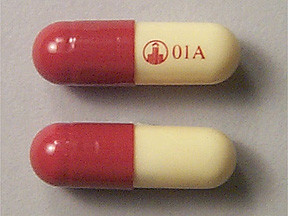ASPIRIN/DIPYRIDAMOLE SUSTAINED-RELEASE - ORAL
PHONETIC PRONUNCIATION: (AS-pir-in/DYE-pir-ID-a-mole)
COMMON BRAND NAME(S): Aggrenox
GENERIC NAME(S): aspirin/dipyridamole
Uses
USES: This medication is used to reduce the risk of stroke in patients who have had "mini-strokes" (transient ischemic attacks) or a previous stroke due to a blood clot and are at high risk for another stroke. It contains two medications: a very low dose of aspirin (25 milligrams per tablet) and dipyridamole in a slow-release form. Low-dose aspirin and dipyridamole are antiplatelet drugs that work to keep blood flowing to the brain by stopping platelets from clumping together. This helps prevent the platelets from forming blood clots, which can lodge in the brain and cause a certain type of stroke (ischemic stroke).
How to use ASPIRIN/DIPYRIDAMOLE SUSTAINED-RELEASE - ORAL
HOW TO USE: Read the Patient Information Leaflet if available from your pharmacist before you start taking this product and each time you get a refill. If you have any questions, ask your doctor or pharmacist. Take this medication by mouth with or without food as directed by your doctor, usually twice daily (morning and evening). Swallow the capsule whole. Do not crush or chew the capsules. Doing so can release all of the drug at once, increasing the risk of side effects. Take this medication with a full glass of water (8 ounces or 240 milliliters) unless your doctor directs you otherwise. The dosage is based on your medical condition and response to treatment. Use this medication regularly to get the most benefit from it. To help you remember, take it at the same times each day. Do not try to replace this combination medication with aspirin and dipyridamole taken separately. You would not be able to get the right dose and slow-release dosage form, so the separate medications would not work as well as this combination medication. Consult your pharmacist for more information.
Side Effects
Precautions
Interactions
Overdose
Images

- color
- red
- shape
- oblong
- imprint
- logo and 01A

- color
- red
- shape
- oblong
- imprint
- logo and 01A

- color
- red
- shape
- oblong
- imprint
- AN, 596

- color
- red
- shape
- oblong
- imprint
- logo and 01A

- color
- red
- shape
- oblong
- imprint
- AN, 596

- color
- red
- shape
- oblong
- imprint
- AN, 596

- color
- red
- shape
- oblong
- imprint
- AN, 596
Reviews
Faq for ASPIRIN/DIPYRIDAMOLE SUSTAINED-RELEASE - ORAL
Aspirin/dipyridamole sustained-release is a combination medication used to reduce the risk of stroke in patients who have previously suffered from mini-strokes or certain types of heart valve disease.
Aspirin helps prevent blood platelets from sticking together, which reduces the formation of blood clots. Dipyridamole helps improve blood flow by relaxing and widening blood vessels.
The usual recommended dosage is one capsule twice a day, with each capsule containing 25 mg of aspirin and 200 mg of dipyridamole.
Common side effects may include headache, dizziness, upset stomach, diarrhea, and flushing. However, inform your doctor immediately if you experience more severe side effects like chest pain, difficulty breathing, or signs of an allergic reaction.
Before starting any new medications, it is essential to consult with your healthcare provider. Some drugs may interact with aspirin/dipyridamole, potentially affecting its effectiveness or increasing the risk of side effects.
It is generally advised to avoid or limit alcohol consumption while on medication, as it can increase the risk of stomach bleeding associated with aspirin.
It is important to inform your doctor if you are pregnant or planning to become pregnant. They will weigh the risks and benefits and determine the best course of action for you.
If you miss a dose, take it as soon as you remember. However, if it is close to your next dose, skip the missed dose and continue with your regular dosing schedule. Do not take a double dose to make up for a missed one.
It is essential to consult with your doctor before stopping the medication. Suddenly stopping aspirin can increase the risk of blood clots and stroke, especially if you have been taking it regularly.
Disclaimer
IMPORTANT: HOW TO USE THIS INFORMATION: This is a summary and does NOT have all possible information about this product. This information does not assure that this product is safe, effective, or appropriate for you. This information is not individual medical advice and does not substitute for the advice of your health care professional. Always ask your health care professional for complete information about this product and your specific health needs.
No Reviews Yet